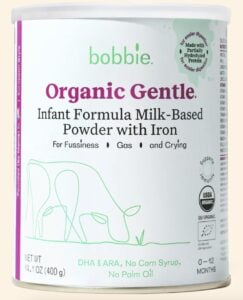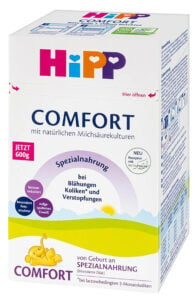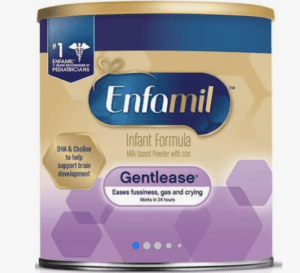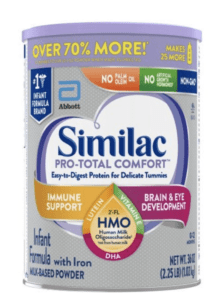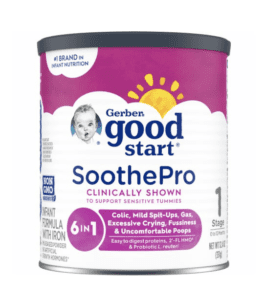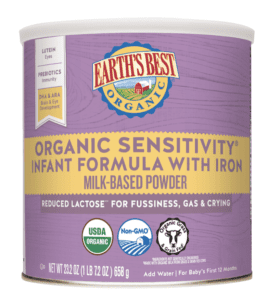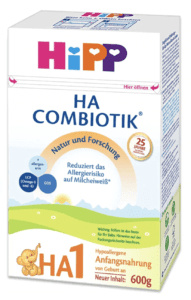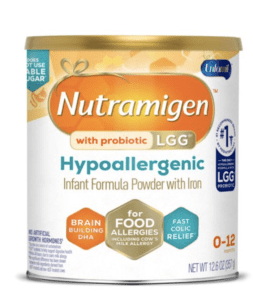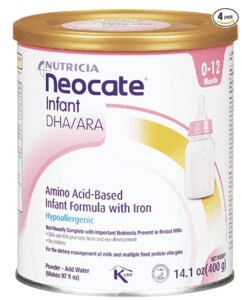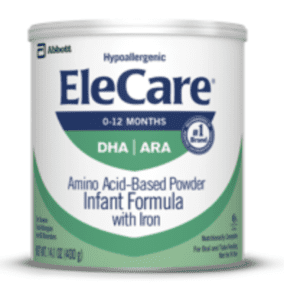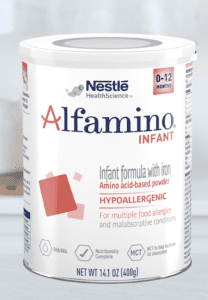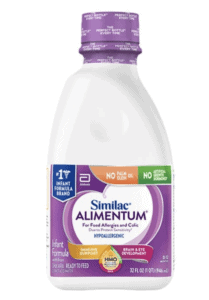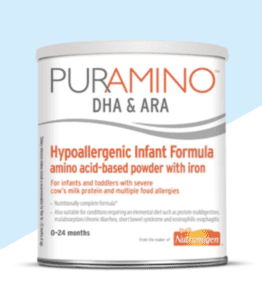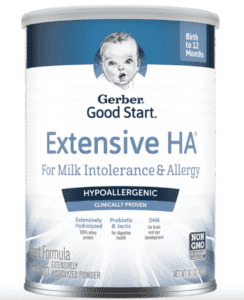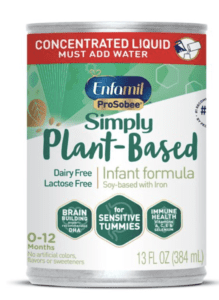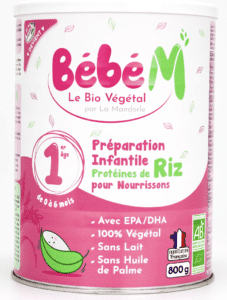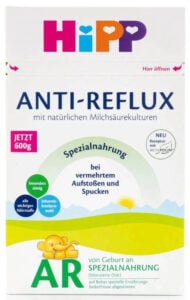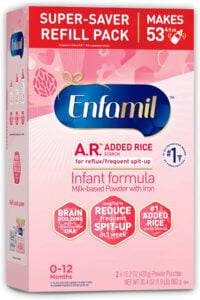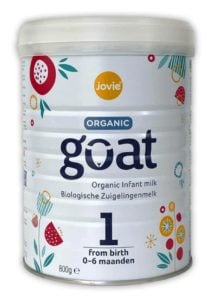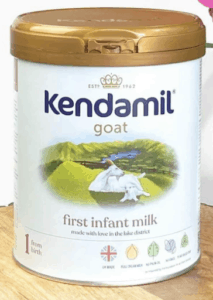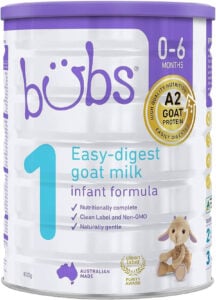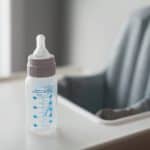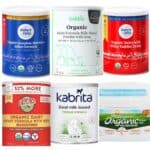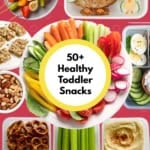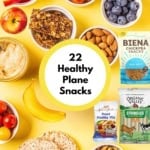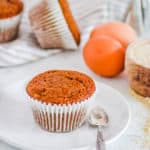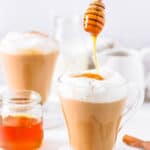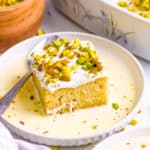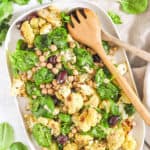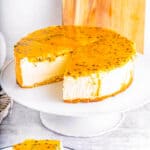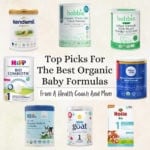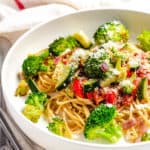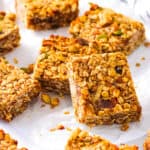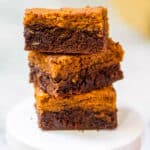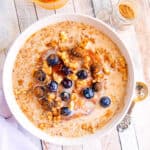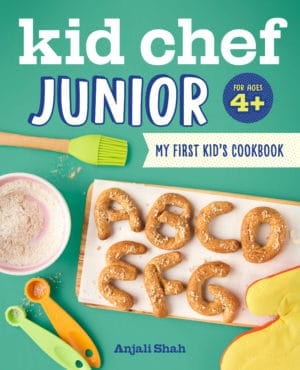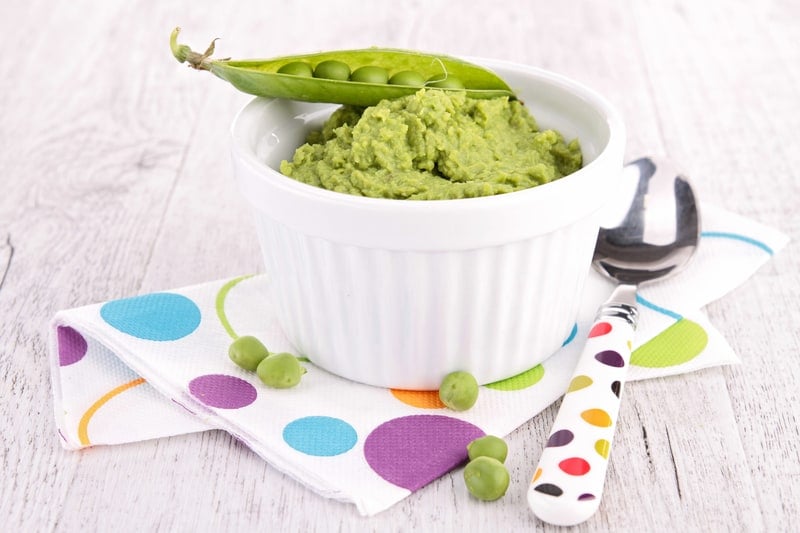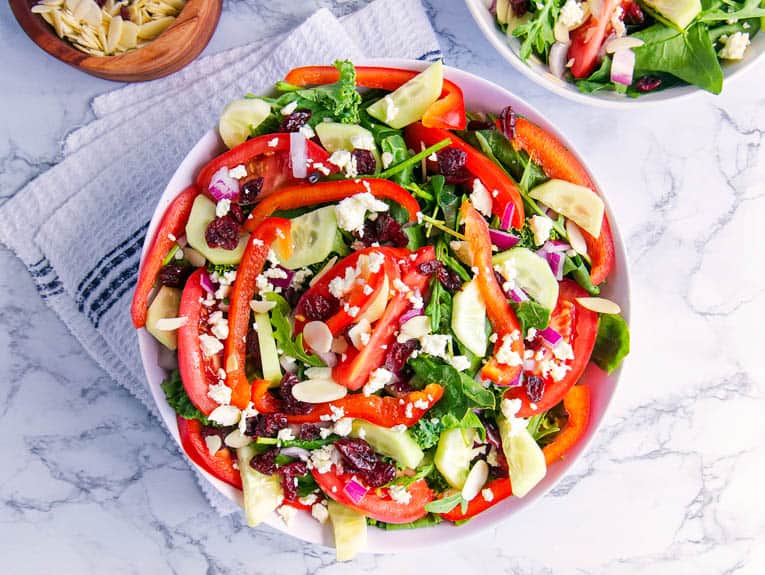The Best Formula for Colic (2024 Guide)
This post may contain affiliate links. As an Amazon Associate, I earn from qualifying purchases. Please read my disclosure.What is the best formula for colic babies? In this helpful guide, I’ll review what colic is, what causes it, how to soothe a baby with colic, answer common questions about it, and share the best baby formulas for colic!
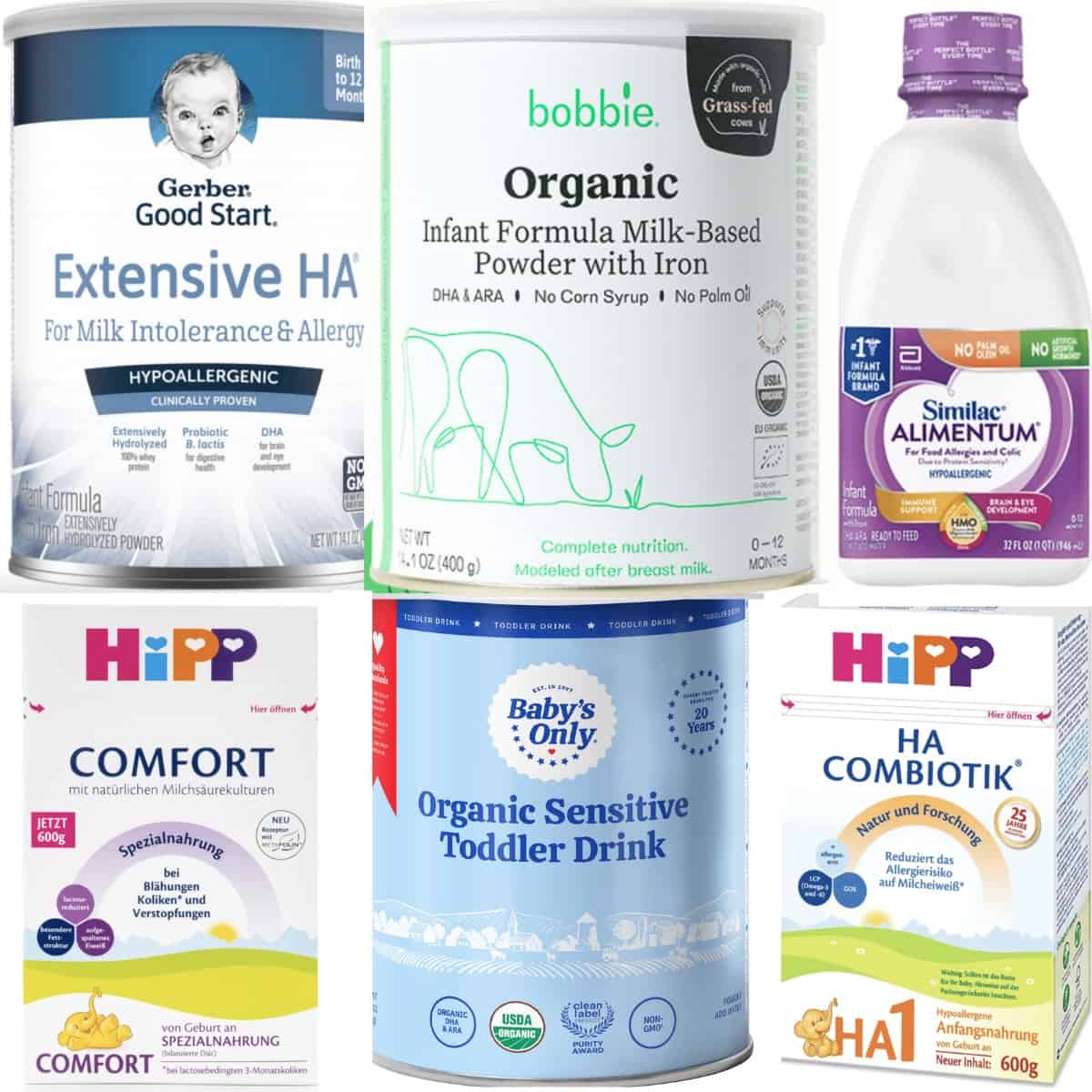
If your infant is excessively crying and fussing for what seems like no reason, you may have a colicky baby on your hands. As parents, nothing is harder than seeing our precious little ones in pain. Colic is extra challenging because the cause of our children’s discomfort can be hard to pinpoint.
You may be wondering how you can help your newborn feel better. Thankfully, there are many ways to help colicky babies. There are also many soothing strategies to apply and special formulas are available to ease colic symptoms and stop your baby’s crying. If you’ve been endlessly searching for the best formula for colic babies or treatments for your little one, this is the guide for you!
Disclaimer
As a board certified health coach and certified nutritionist, I support products and ingredients that are rooted in science and are evidence-based. Using my background in nutrition, extensive research, consultations with experts, and my own experience giving my two kids formula, I arrived at this list of the best formulas for acid reflux in this guide. Linzy Ziegelbaum, MS, RD, CDN has also medically reviewed and fact-checked this guide (see my about page for more info about Linzy).
Though I may receive a commission (at no extra expense) if you purchase through some of the affiliate links provided, I only recommend products I’ve researched, evaluated, consulted experts on, and would feel comfortable giving to my own two children.
As always, I only share products that are the highest quality and that can help you and your family the most. By purchasing any of these products from the links below, you help keep this blog running, so thanks for your support!
Keep in mind that every baby and situation is different, especially when it comes to colic. Always consult your child’s pediatrician to diagnose and treat colic before starting or switching to a new formula. My recommendations are not a substitute for professional medical advice, diagnosis, or treatment.
Formula prices are current at the time of this publication but are subject to change.
Quick Picks: The Best Formulas For Colic
Here is my shortlist of the best colic baby formulas, categorized by type!
AR Formulas
Goat Milk Formulas
What Is Colic?
Colic, also known as infantile colic, is the frequent and excessive crying of newborns during their first three months of life (source). Technically speaking, it is defined as a baby’s crying for over three hours a day, more than three days per week, and for at least three weeks (source). Experts believe that colic affects at least 20% of babies (source).
Colic can be particularly upsetting and stressful for parents because it can be hard to identify the source of the baby’s distress and common consolation efforts usually do not bring relief. Though the condition can be incredibly frustrating for parents, it is harmless to the baby and disappears by the time they are 3-4 months old (source).
What Are Common Colic Symptoms?
While colic symptoms can vary between babies, features of a baby’s colic typically include (source):
- Crying for No Apparent Reason: Unlike when crying can be remedied by feeding or a diaper change.
- Intense Crying: Colic crying usually sounds more like screaming or like they are in pain.
- Extreme Fussiness: That continues after the baby stops crying.
- Predictable Timing: Colic episodes frequently occur in the evening.
- Body Tension: A tight abdomen, curling their legs up to their tummy while they cry, clenched fists, or stiff legs.
- Flushed Face: Discoloration that looks like intense blushing.
- Gas: Burping often or passing a lot of gas
What Causes Colic?
The exact cause of colic is unknown (source). Medical experts anticipate that it likely results from several factors, such as the following (source, source):
- Inability to self-soothe
- Sensitivity to environmental stimuli (lights, sounds, etc.)
- An immature digestive system that doesn’t yet efficiently process food
- An imbalance of healthy bacteria in the digestive tract
- Cow milk allergy (CMA) or cow milk protein allergy (CMPA)
- Other food allergies
- Overfeeding or underfeeding
- Early forms of childhood migraine
- Hormones
- Gas
At-Home Colic Soothing Remedies
If you think your baby has colic, you can try several home remedies to alleviate some of their discomfort. Here are some at-home colic remedies (source, source):
- Tummy Time: Lay your baby on its tummy or hold them belly-down on your forearm. Gentle pressure on a baby’s belly can sometimes help relieve colic. Rubbing their back is also soothing and helpful for passing gas.
- Hold, Wear, or Carry Them: Colicky or gassy babies often respond well to being held. If holding them for long periods of time isn’t doable, consider wearing them in a baby wrap or carrying them in a baby carrier.
- Repetitive Motion: Take your baby for a walk, rock them, use a baby swing, or even take them for a drive. The repetitive motion is known to help soothe colic symptoms.
- Sit Upright After Feeding: Sometimes, gastroesophageal reflux (in the form of acid reflux or gastroesophageal reflux disease, GERD) is what causes your baby’s colic. This means that your baby experiences a form of heartburn as breast milk or formula comes back up their esophagus after eating. Holding them upright can reduce these acid reflux symptoms.
- Thicken Milk or Formula with Infant Cereal: To reduce reflux, you can add infant cereal to formula or breast milk as a thickening agent (source). Always confirm this remedy with your child’s doctor before implementing it.
- Use Anti-Colic Baby Bottles: Or, bottles specifically designed to prevent colic by limiting the amount of air entering the milk or formula during feeding.
- Check the Bottle Nipple Size: Ensure your baby’s milk flow isn’t too fast. Also, always keep the formula in the nipple while your child feeds to limit excess air consumption while feeding.
- Create A Calming Atmosphere: Turn on a white noise machine, hold or feed your baby in a cool and dark room, or limit ambient noise or stimulation to help calm your baby’s (and your) nervous system!
- Try a Different Formula: If your baby isn’t responding well to your current formula, exploring other options with your child’s pediatrician might be a good idea. A hypoallergenic, anti-reflux, lactose or milk-free, or sensitive formula might do the trick. See my list below for more information.
Can Baby Formula Cause Colic?
In short, baby formula can create or exacerbate colic symptoms but it isn’t a condition limited to only formula-fed babies (source). Breastfed babies can also struggle with colic.
If formula feeding, bottle feeding too quickly– finishing a bottle in less than 20 minutes– or giving your baby too much formula can cause reflux, aggravating colic symptoms (source). Additionally, the lactose or milk sugar present in standard infant formula may also be a source of discomfort for your baby or your child may have a food allergy, such as cow milk allergy (CMA; source, source).
If you are concerned if any of these situations are contributing to your infant’s colic, reach out to your child’s pediatrician for diagnosis and to discuss if you should change your child to a different formula.
What To Look For When Choosing A Baby Formula For Colic
While the best formula for your colicky baby will depend on their specific needs (more of that below!), there are a few things you should look for when choosing the best formula for colic:
- Probiotics and Prebiotics: These can help ease digestion by balancing the gut microbiome, easing colic symptoms (source).
- Non-GMO and Organic Ingredients: Not only do organic or non-GMO formulas tend to have more probiotics, prebiotics, and healthy fats, but studies show that the organic lactose in them is easier for babies to digest than conventional lactose(source), meaning that they could naturally help with colic symptoms associated with problematic digestion. Note: some hydrolyzed protein formulas cannot be labeled organic due to how the hydrolyzed proteins are produced. If your doctor recommends this formula for your baby, you can look for a hydrolyzed protein formula with otherwise organic ingredients.
- Additives That Enhance Growth & Development: Such as DHA and ARA. DHA and ARA are essential fatty acids that have been known to support infant brain and eye development, the immune system, and overall growth (source). They are naturally occurring in breast milk (due to the diet/supplementation of the mother), so many experts believe they are beneficial to have in formula as well (source). The Food and Drug Administration (FDA) doesn’t require that these are added to formula so check with the brands you are considering to see if they include them.
A note on corn syrup, syrup solids, and maltodextrin in colic formula: When it comes to general milk-based formula, I almost always recommend brands that contain lactose as their main source of carbohydrates. However, the same guidelines usually do not apply to hypoallergenic formulas. Whereas some colicky babies can tolerate hypoallergenic formula containing organic lactose, children diagnosed with lactose intolerance, cow milk allergy (CMA), or cow milk protein allergy (CMPA) need to avoid it altogether.
Therefore, the best formula options for many children with food allergies are hypoallergenic formulas made with corn syrup, corn syrup solids, or maltodextrin. Some vegan brands, such as BéBé M have a corn or rice base, but these brands can be harder to find or more expensive.
Breastfeeding And Colic
Many are quick to suggest eliminating foods from the breastfeeding mother’s diet upon the onset of a breastfeeding baby’s colicky symptoms. There are many potential issues that could be causing infant upset that need to be addressed before eliminating foods, such as (source, source):
- Not having a good latch
- Slow milk letdown reflex
- Fast milk letdown reflex
- Switching breasts too early or often during feeding
- Timing feedings
- Reflux or gas after feedings
- Infant hunger
- Probiotic imbalance
For example, if the baby is not latched properly, they may take in too much air as they feed, causing digestive distress during and after feeds. They may also not ingest enough milk, crying after feeding because they are still hungry.
Babies timed at the breast or prematurely switched to the second breast may still be hungry after feeding. This means that they received an abundance of the lactose-rich foremilk but a lack of the fat and protein-rich hindmilk that comes after. When this happens, babies exhibit lactose intolerance symptoms when they just need the full supply of milk to balance the milk composition and soothe their digestion.
Often, changing your diet or switching to formula is unnecessary. Sometimes, switching to formula helps infants because bottle feeding regulates the flow of milk and prevents excess airflow. In such situations, pumping and bottle-feeding breast milk may be just as helpful for the infant, regardless of the mother’s diet (source).
If you are concerned that breastfeeding may be causing your baby colicky symptoms or need help sorting them out, a licensed lactation consultant or your child’s pediatrician can help. They can help troubleshoot the issues that may be causing your child’s discomfort and find a solution that works best for you and your baby.
New research is also exploring the connection between probiotics and colic (source). In these studies, experts are finding that the addition of Lactobacillus reuteri DSM 17938 has the potential to reduce infantile colic symptoms by up to 50%. If you are interested in giving probiotics to your child to treat their colic, discuss this with your child’s pediatrician before adding them to their diet.
If your child still has colic symptoms after troubleshooting all of the non-dietary-related options, consider removing foods from your diet. On some occasions, proteins in the mother’s diet pass through their milk, affecting the infant. Usually, these aggravating proteins are from cow’s milk.
In such situations, testing out removing the following products from your diet one at a time until you have noticed an improvement in your child’s symptoms (source):
- Dairy: Milk, yogurt, cheese, ice cream, cottage cheese, and more (see more here).
- Caffeine: Coffee, chocolate, tea, and energy drinks.
- Certain Vegetables & Beans: Broccoli, cauliflower, brussels sprouts, cabbage, garlic, onions, and beans.
- Certain Fruits: Melons, stonefruit (apricots, plums, prunes), and rhubarb.
Note: If breastfeeding and dietary troubleshooting do not resolve your baby’s colic symptoms, contact your doctor to discuss taking oral enzymes (source) or temporarily transitioning to a hypoallergenic formula (source).
Types Of Formula To Help With Colic
There isn’t one best baby formula for colic that works for all babies, as the right formula will depend on your baby’s specific circumstances. Below is an overview of the different types of formulas that can help with colic and the situations in which they can be helpful.
Always remember to see your child’s doctor to diagnose colic. The doctor’s diagnosis will dictate which is the best colic formula for your baby.
Sensitive Formulas
Sensitive formulas are made with partially hydrolyzed proteins, which means that the milk proteins are partially broken down to make them easier to digest. Many also contain reduced lactose, prebiotics, or probiotics to support gentle digestion. Sensitive formulas are generally less expensive than hypoallergenic formulas and can be a good fit for infants who have been diagnosed with lactose intolerance or sensitivity to dairy.
Hypoallergenic
This type of formula is made with extensively hydrolyzed or fully hydrolyzed proteins. These proteins are broken down into smaller pieces, or “pre-digested,” making them easier for infant digestive systems to process and less likely to cause an allergic reaction.
Within this category, there are extensively hydrolyzed formulas and amino acid formulas. Extensively hydrolyzed are formulas in which the milk proteins are broken down to the extent that the body does not recognize them. Amino acid formulas are made with amino acids, the elemental building blocks of protein (source).
Both forms of hypoallergenic formulas are great options for cow’s milk allergy, cow’s milk protein allergy, and multiple food allergies. Hypoallergenic formulas are the most expensive type of formula on this list, but some insurance companies can cover all or part of the cost if your child’s pediatrician deems them medically necessary.
Acid Reflux (AR) Formula
This is the least common type of formula for colic, but an acid reflux formula can be helpful if your child’s doctor determines that acid reflux is the culprit for your child’s colic symptoms. Many of these formulas are thickened with rice to help them stay in the stomach, reducing regurgitation
Goat’s Milk & A2 Milk Formula
These formulas are sensitive or good for digestion not because of hydrolyzed protein but because of their particular type of milk protein. Whereas cow’s milk contains the A1 beta-casein protein, goat milk and A2 milk contain the A2 beta-casein protein, which is easier to digest (source). Therefore, because goat milk and A2 milk formulas contain the A2 beta-casein protein they can be easier for babies to digest.
The Best Formulas for Colic
If you have a colicky baby at home, you may choose to turn to a specialized formula to help ease symptoms. If you’re interested in giving this a go, here are my top picks for the best formula for colic babies.
Sensitive Formulas
Bobbie Organic Gentle Formula
Why I Love It: When it comes to the best formulas for babies with gas, fussiness, and crying, Bobbie Organic Gentle is at the top of the list. This sensitive formula is made in the United States but with a European-style recipe. Bobbie is a female-founded and mom-led infant formula company that makes organic formulas modeled after breast milk.
Bobbie Organic Gentle is made with organic partially hydrolyzed protein and organic lactose for easier digestion. This formula is a fantastic option for babies who have trouble tolerating intact milk protein but are not diagnosed with milk or food allergies. Bobbie is also made without palm oil, which can be known to lead to constipation in babies.
Though the flagship Bobbie Formula is available at Target, Organic Gentle is only available on the Bobbie website. They offer a super convenient subscription service so you never run out of formula, and with a subscription you’ll save 10% off your first two orders. You can even modify or adjust it to send it to a new address when you are traveling or cancel it at any time, no questions asked!
The only main drawback of this formula is that it does not contain probiotics or prebiotics, but Bobbie does now offer an infant probiotic supplement. These probiotic drops are made with a USDA organic probiotic that has been studied to support calm digestion and reduce colic symptoms. Note: always talk with your doctor before adding additional supplements like this to your baby’s diet.
Where To Buy: Company Website
Cost: $28 for a 14.1 oz canister of formula powder.
Pros
Cons
HiPP Comfort Classic
Why I Love It: Another fantastic HiPP offering, this Comfort Classic powdered formula is made with hydrolyzed proteins, reduced lactose, and a special fat composition that mimics breast milk to support gentle and comfortable digestion. It is a great option for little ones experiencing digestive discomfort associated with colic or the inability to digest intact proteins easily.
The main difference between HiPP Comfort Classic and HiPP Comfort UK is that this variety contains probiotics (Lactobacillus Fermentum CECT5716)—the same probiotic found in human breast milk—maltodextrin and slightly higher levels of lactose. Unfortunately, the Comfort Classic also contains fish oil, making both formulas unsuitable for babies following a vegetarian diet.
Note: HiPP Comfort Classic does contain palm oil, but it is certified by independent inspection bodies to be sustainably cultivated.
Where To Buy: Baby Milk Bar
Cost: $39.99 for a 600g box of the formula powder. Buy in bulk for as low as $35.14 per box.
Pros
Cons
Enfamil NeuroPro Gentlease
Why I Love It: With 80% less lactose than traditional milk-based formulas and partially hydrolyzed proteins, Enfamil NeuroPro Gentlease is a milk-based infant formula designed to help reduce crying, gas, and spit-up within 24 hours. It is made with a whey-to-casein ratio of 60:40, like mature breast milk, supporting gentle infant digestion.
This non-GMO formula contains DHA for brain and eye development and prebiotics to support digestion and the immune system (source). Unfortunately, the main source of carbohydrates in NeuroPro Gentlease is corn syrup solids; otherwise, this product is one of the best formulas for colic and gas.
Note: If your child is diagnosed with a milk allergy or lactose intolerance, this brand might not be allergen-friendly enough since it contains milk and lactose. Always consult your child’s physician for the best formula recommendation for your child.
Where To Buy: Amazon
Cost: $59.84 for a 998g box of formula powder. Subscribe and save for up to 15% off.
Pros
Cons
Similac Pro Total Comfort
Why I Love It: Made with partially hydrolyzed whey protein, Similac Pro Total Comfort is formulated for gentler digestion. In fact, parents report that their children had reduced colicky symptoms of fussiness and crying within one day of feeding this formula.
This formula contains prebiotics, DHA, and ARA. It is made with corn maltodextrin instead of corn syrup, limiting processed sugars while minimizing dairy and lactose. One of the best aspects of this formula that parents will love is its price: it is one of the more affordable options on this list, coming in at $33.69 for a 20.1 oz tub, or up to half the price of some other colic formula.
Cost: $33.69 for a 20.1 oz tub of formula powder. Subscribe and save up to 15%.
Pros
Cons
Similac Total Comfort European
Why I Love It: Very similar to Similac Pro Total Comfort, Similac Total Comfort is manufactured in Spain and started being imported into the United States during the 2022 formula shortage.
This formula is made with hydrolyzed proteins, making it easy to digest and good for babies who have difficulty tolerating traditional milk-based formulas. It contains prebiotics to support your child’s immune system, DHA and ARA to support brain and eye development, and is non-GMO.
Similac Total Comfort European is one of the more budget-friendly formulas on this list. It is much more affordable than Similac Pro Total Comfort, it’s America-made counterpart, as well. Like Pro Total Comfort, this formula uses maltodextrin as a carbohydrate source instead of corn syrup and it doesn’t contain palm oil.
Where To Buy: Amazon
Cost: $32.07 for an 820g (28.9 oz) canister of formula powder. Subscribe and save for up to 15% off.
Pros
Cons
Gerber Good Start Soothe Pro
Why I Love It: If you’re looking for a formula for a colic baby that doesn’t break the bank, Gerber Good Start SoothePro is another great option. At $32.25 for a 19.4-oz canister, this formula is made with reduced lactose, corn maltodextrin instead of corn syrup, hydrolyzed whey protein, prebiotics, and probiotics. The probiotic lactobacillus reuteri has been proven to improve infant digestion in studies, reducing the crying, fussiness, and gas commonly associated with colic (source).
Although corn maltodextrin isn’t the ideal carbohydrate source in formulas because it is processed, it is a valuable source of lactose-free energy for babies with cow milk allergy (source).
This Gerber formula is also non-GMO and contains DHA and ARA. It is easy to find on Amazon and many major retailers. Unfortunately, it contains palm oil and soy but is a great sensitive formula for colic babies.
Cost: $32.25 for a 19.4 oz canister of formula powder. Subscribe and save up to 15%.
Pros
Cons
Earth’s Best Organic Sensitivity Infant Formula
Why I Love It: This reduced-lactose formula is designed specifically for babies with fussiness, gas, or crying. It is easier for tiny tummies to digest, fortified with iron, and contains ARA and DHA.
This formula is not hydrolyzed, so it may not work for babies with a cow’s milk allergy, but otherwise is a good option to support gentle digestion. If your child’s pediatrician recommends a hydrolyzed protein formula, consider Earth’s Best Organic Gentle Formula.
Some customers say their babies don’t love the taste of this formula, however, others have said the opposite. Every baby has their preference, so it’s all about finding the best option for your child.
Where To Buy: Amazon, Target, & Walmart
Cost: $39.99 for a 21 oz canister of formula powder. Subscribe and save up to 15%.
Pros
Cons
Hypoallergenic Formulas
HiPP HA
Why I Love It: Made with hydrolyzed cow milk proteins which are easier for your little one to digest, HiPP HA is created specifically for babies with sensitive stomachs. Though HiPP HA cannot be certified organic because of the hydrolyzed proteins, the rest of the ingredients are organic and non-GMO.
This hypoallergenic formula also contains probiotics, prebiotics, DHA, and ARA, making it a complete nutrition source for your child. Of all the formulas on this list, this option is the most like breast milk, making it the best baby formula for colic.
HiPP HA does contain lactose so it isn’t a good option for children with CMA or CMPA. The DHA and ARA are also derived from fish oil, making it not vegetarian-friendly.
Where To Buy: Baby Milk Bar, OBF24
Cost: $41.99 for a 600g box of formula powder. Buy in bulk for as low as $34.99 per box.
Pros
Cons
Enfamil Nutramigen
Why I Love It: If your doctor determines that lactose intolerance, cow milk allergy, or cow milk protein allergy is causing your baby’s colic, Nutramigen is a great formula. It is made with hydrolyzed proteins and probiotic LGG (lactobacillus rhamnosus GG), which has been studied to help soothe digestion in colicky babies (source).
Enfamil claims that this colic baby formula is clinically proven to reduce colic due to cow’s milk allergy within 48 hours. It also helps babies overcome cow’s milk allergy so they can return to consuming traditional formula in as soon as 6 months.
Nutramigen is made with corn syrup solids and modified corn starch, but since lactose is problematic for children with lactose intolerance, alternative carb sources like corn syrup are necessary. Nutramigen is the #1 pediatrician-recommended formula brand for cow’s milk allergy and a best formula for colic and gassy babies.
Cost: $69.99 for a 27.8 oz can of formula powder. Buy in bulk for $67.99 per can.
Pros
Cons
Neocate
Why I Love It: If your child was diagnosed with milk or other food allergies, Neocate Infant Formula is one of the best picks. With a 100% dairy-free amino acid base, it was designed specifically for infants with CMA, multiple food allergies (MFA), and other related medical and dietary conditions.
Unfortunately, because this formula is dairy-free, its main carbohydrates come from corn syrup solids. Otherwise, it contains DHA and ARA, is made in a dairy protein-free facility, contains no artificial colors, flavors, or sweeteners, and is the only hypoallergenic formula to be soy-free.
Note: Neocate is a specifically formulated medical food and should only be given to children under medical supervision. Always consult your child’s pediatrician before starting them on Neocate or making any changes to their diet.
Where To Buy: Amazon
Cost: $44.30 for a 14.1 oz canister of the formula powder.
Pros
Cons
Elecare
Why I Love It: If your child’s doctor determines that your child’s inability to tolerate intact or hydrolyzed protein is at the root of their colic symptoms, EleCare is a great option. It is made with free amino acids, is hypoallergenic, and contains DHA and ARA for brain and eye development and medium-chain triglycerides for fat absorption.
Pediatric gastroenterologists recommend EleCare the most. It is one of the more expensive options on this list, but some insurance companies will cover the cost of a hypoallergenic formula if it is medically necessary.
Where To Buy: Amazon & Walmart
Cost: $48.98 for a 14.1 oz canister of formula powder. Subscribe and save up to 15%.
Pros
Cons
Nestlé Alfamino
Why I Love It: Another formula created for CMA/CMPA and MFA, Nestlé Alfamino Infant Formula meets the American Academy of Pediatrics (AAP) criteria for being hypoallergenic. It is made with free amino acids which are easy on infant digestion and medium-chain triglycerides (MCT) which help improve fat absorption.
Alfamino does not contain DHA and ARA (the front of the container says DHA/ARA but when I looked at ingredients I did not see listed), probiotics, or prebiotics, and the number one source of carbohydrates is corn syrup solids, but if severe food allergies are at the root of your child’s colic, this brand could be a good one to discuss with your child’s doctor.
Where To Buy: Amazon
Cost: $47.49 for a 14.1 oz canister of formula powder. Subscribe and save for up to 15% off.
Pros
Cons
Similac Alimentum
Why I Love It: Similac is on my list of the best formula for colicky babies because it is a high-quality hypoallergenic formula that is easy to find and very highly reviewed by parents. This formula is made from hydrolyzed proteins and medium-chain triglycerides, which are delicate on young digestive systems. In a clinical study, colic symptoms due to protein sensitivity were reduced within 24 hours of beginning to feed Similac Alimentum.
Though this formula contains DHA, ARA, and prebiotics and is free of palm oil, it does contain sugar as the main carbohydrate. The formula also has milk-derived ingredients, such as casein hydrolysate, but it is free of lactose and still safe for food allergies, lactose intolerance, and colic.
Finally, Similac Alimentum comes in powder as well as ready-to-feed formula. Though the ready to feed formula can make for quick and easy preparation, the powdered formula can be easier to store. Choose the form that best fits your family’s lifestyle.
Cost: $13.29 for a 32 fl oz ready-to-feed bottle or $54.99 for a 19.8 oz canister of formula powder.
Pros
Cons
PurAmino Infant Formula
Why I Love It: From the makers of Nutramigen comes PurAmino, a hypoallergenic infant formula developed for infants and toddlers with severe cow’s milk protein allergy and multiple food allergies that cannot be managed with hydrolyzed formula. Made with amino acids, this formula is dairy-free, lactose-free, and contains medium-chain triglycerides to facilitate fat absorption. It is the best formula milk for colic babies with severe food allergies.
Recent studies show that PurAmino drastically lowered instances of bloody stool, diarrhea, spitting up, and vomiting for children with CMPA within 1 doctor visit. It also lowered the instances of eczema and itching by over 73% in the same time period.
With higher levels of DHA and ARA than other hypoallergenic formulas and amino acid-based formulas, PurAmino is a complete nutrition source you can trust. It can be hard to find in stores and goes out of stock quickly, as the infant version isn’t readily available in stores or online. However, you can get it one of these four ways: home delivery, at the pharmacy, through select retailers, and home care providers.
PurAmino is pretty expensive. Some insurances will cover some or all of the cost, however, if your child’s doctor prescribes it as medically necessary.
Where To Buy: Walmart
Cost: $60 for a 14.1 oz canister of formula powder.
Pros
Cons
Gerber Extensive HA
Why I Love It: This formula is designed specifically for babies with a cow’s milk protein allergy, and has 100% ultra-filtered, hydrolyzed whey protein. It’s made with probiotics, DHA and ARA, and is also lactose-free so it’s suitable for babies with lactose intolerance. Keep in mind that because it is lactose-free, it uses a combination of maltodextrin and corn syrup solids to replace lactose as a carbohydrate.
Where To Buy: Amazon
Cost: One 14.1oz can is $30.72
Pros
Cons
Enfamil ProSobee
Why I Love It: Enfamil ProSobee is one of the most popular American-made plant-based formulas. It is made with soy protein isolate instead of dairy or animal protein, making it an alternative option to classic hypoallergenic formulas.
Overall, it is a pretty solid offering. It is a soy-based infant formula specifically formulated for babies with lactose intolerance. Since it is milk and dairy-free, it may also be a good formula to ease a cow’s milk protein allergy.
The safety of long-term soy infant soy consumption is debated (source), so if you have concerns about this ingredient a plant-based formula with a different protein base, such as BéBé M (see below), may be a better option.
Enfamil ProSobee is not non-GMO or organic, doesn’t contain probiotics or prebiotics, is made with corn syrup solids, and also contains palm oil. Some parents also report that it is hard to dissolve when mixing.
Where To Buy: Amazon & Walmart
Cost: $38.88 for a 593g canister of formula powder. Subscribe and save up to 15%.
Pros
Cons
BéBé M (Bebe Mandorle)
Why I Love It: Developed as a nutritionally complete formula for babies with CMA, CMPA, lactose intolerance, or reflux, BéBé M is 100% dairy-free and lactose-free. So, if any of these conditions are determined to cause your baby’s colic, you may want to consider a vegan baby formula such as BéBé M.
This formula is made with organically farmed corn maltodextrin and hydrolyzed rice protein, making it more natural than some of the other hypoallergenic formulas. It is sugar and corn syrup-free and contains plant-based DHA and ARA. It does not contain palm oil.
BéBé M is considered a “Foods for Special Medical Purposes (FSMPs)” and should only be given to your child under medical supervision. Always consult your doctor before feeding this formula to your child. It is also more expensive, but some insurance companies will cover part or all of the formula expenses if your child’s healthcare provider deems it medically necessary.
Some parents report that BéBé M is difficult to mix, but they find that using a baby formula dispenser can help.
Where To Buy: Organic Best Shop
Cost: $64.99 for a 600g canister of formula powder. Buy in bulk for as low as $58.99 per can.
Pros
Cons
AR Formulas
HiPP AR
Why We Love It: If acid reflux contributes to your baby’s colic symptoms, a thickened acid reflux formula, such as HiPP AR formula, can help. This formula is the best for acid reflux—it is thickened naturally with locust bean gum and maltodextrin to help the formula stay in the stomach, reducing regurgitation and reflux. It is also non-GMO and does not contain any sugar or corn syrup. RELATED: Best Formulas For Reflux.
This soothing formula has a natural lactic acid culture, Lactobacillus Fermentum Hereditum®, a probiotic proven to support infant digestion (source). Prebiotics are also added to the formula to support the immune system. Though the formula contains DHA and ARA, they are added by means of fish oil which means that this formula is unfortunately not vegetarian or vegan-friendly.
Where To Buy: OBF24
Cost: $39.99 for a 600g box of formula. Buy in bulk for as low as $32.99 per box.
Pros
Cons
Enfamil AR
Why I Love It: Thickened with rice starch, Enfamil AR is another great formula option for little ones whose colic symptoms are caused by acid reflux. This non-GMO formula is clinically proven to reduce spit-up by over 50% in one week. It also has reduced levels of lactose, making it gentler on digestion than traditional milk-based formulas.
Enfamil AR contains DHA and ARA for brain and eye development as well as prebiotics and probiotics for digestion and immune support. Furthermore, the DHA and ARA are derived from plant sources, making this brand vegetarian-friendly, unlike HiPP AR.
Pediatricians and parents trust Enfamil as the number one infant formula. Although their acid reflux formula is more expensive than HiPP AR, it is easier to find in major retailers.
Where To Buy: Amazon, Target, & Walmart
Cost: $56.99 for an 863g box of formula powder. Subscribe and save for up to 15% off.
Pros
Cons
Goat Milk Formulas
Jovie Goat Milk Formula
Why I Love It: If your child’s doctor determines that cow’s milk protein sensitivity is the culprit for their colic symptoms, goat milk formula can be a great option.
Jovie Goat Milk Formula is my number one pick for goat milk formula. It is organic and non-GMO, contains prebiotics, DHA, and ARA, has no sugar or starches, and is certified to strict European standards. The only drawbacks of Jovie are that it does not contain probiotics, isn’t vegetarian-friendly because of fish oil, and is expensive. Otherwise, it is a fantastic goat milk formula.
Note: Goat milk formulas such as Jovie may not work for babies with a diagnosed milk protein allergy, as goat’s milk still contains milk proteins, just a different protein than cow’s milk. Always consult your doctor when determining the best formula for your baby.
Where To Buy: Organic’s Best
Cost: $63.99 for an 800g gram box of formula powder. Buy in bulk for as low as $56.99 per box.
Pros
Cons
Kendamil Goat
Why I Love It: Kendamil is a family-owned company that manufactures its formula in the town of Kendal in the Lake District of the UK. This formula brand works with British farmers to produce all of its formulas. Though they are not certified organic, Kendamil’s formulas are non-GMO and made with products farmed according to organic principles.
During the 2022 formula shortage, the FDA approved Kendamil for sale in the United States as part of Operation Fly Formula. The formula is now still available for purchase online and at Target.
Similar to the other goat milk formulas on this list, Kendamil goat is made with A2 beta-casein protein to support gentler digestion. A distinguishing feature of Kendamil goat milk formula is that it is made with whole milk goat milk, meaning that they need to add fewer vegetable oils to achieve the ideal fat blend. Because of this, the formula also contains naturally occurring milk fat globule membrane (MFGM), a component found in breast milk that helps with fat digestion and absorption (source).
Kendamil goat contains hexane-free and plant-based DHA and ARA, making the formula vegetarian-friendly. Furthermore, it contains prebiotics and is free of palm oil, starches, sugars, and soy.
Note: Goat milk formulas such as Kendamil may not work for babies with a diagnosed milk protein allergy, as goat’s milk still contains milk proteins, just a different protein than cow’s milk. Always consult your doctor when determining the best formula for your baby.
Where To Buy: Organic’s Best & Target
Cost: $65.00 for an 800g box of formula. Buy in bulk for as low as $59.99 per box.
Pros
Cons
Aussie Bubs Goat Milk
Why We Love It: Aussie Bubs is another exceptional formula brand brought to the American market during the 2022 formula shortage. Aussie Bubs makes an organic cow’s milk formula and this goat milk formula.
Made with Australian goat milk, which contains easier-to-digest A2 beta-casein protein, Aussie Bubs is formulated to be gentle on sensitive infant tummies. This formula doesn’t need to be supplemented with as much vegetable oil to achieve the ideal fat composition as some other brands do because it is made with full-fat goat milk solids. It also has vegetarian-friendly DHA and ARA, prebiotics, and is 100% non-GMO.
One of the best things about Aussie Bubs is that it is a Project Purity Clean Label award winner. This means that it has been tested to be free of over 400 contaminants, giving you the ultimate peace of mind as you feed it to your little one.
Unfortunately, Bubs does not contain probiotics but you can easily supplement an infant probiotic with your child’s doctor’s approval.
Note: Goat milk formulas such as Aussie Bubs may not work for babies with a diagnosed milk protein allergy, as goat’s milk still contains milk proteins, just a different protein than cow’s milk. Always consult your doctor when determining the best formula for your baby.
Where To Buy: Amazon & Walmart
Cost: $49.00 for an 800g canister of the formula powder. Subscribe and save for up to 5% off.
Pros
Cons
FAQs
The exact cause of colic is unknown, so the exact way to prevent it is not known either. However, there are ways to help your baby have more comfortable digestion to help reduce the chances that it leads to colic. These are: Burping your baby throughout feeding, keeping them upright after eating, and feeding your baby at a steady rate (i.e., not too fast or too slow). If your baby breastfeeds, check your baby’s latch if they are breastfeeding, do not time their feeds, and feed them on one breast until emptied before switching to the second.
The best formula for colic babies depends on what aggravates their colic. If a cow’s milk protein allergy is the culprit, a hypoallergenic or dairy-free formula may be the best bet. If they have just a sensitivity to dairy, a sensitive or goat milk formula may do the trick. Speak with your child’s doctor to determine the best formula for them.
In some situations, changing your baby’s formula may help with colic. For example, if your child has lactose intolerance but is taking a formula containing lactose, a lactose-free formula may help. The same goes for cow’s milk allergy and formulas that contain cow’s milk. Always consult your child’s pediatrician before changing formulas and to diagnose the cause of their colic.
Breast milk is still considered the gold standard for infant nutrition, so it is best to troubleshoot breastfeeding situations that may be causing your baby’s colic before switching to formula. See the “Breastfeeding and Colic” section above for more information and advise a lactation consultant or your child’s pediatrician for more support.
While every colicky baby is different, colic symptoms typically begin when infants are about 3 weeks old and disappear usually by the time they are 3 months old.
A hallmark of colic is that it usually occurs around the same time every day. While colic symptoms appear to come on suddenly, most babies get fussier in the evenings when digestion slows down.
Final Thoughts
Hopefully, this post helped you to better understand colic, find comprehensive solutions to treat your baby’s colic, and determine the best formula for colic for you and your baby!
As always, if you have more questions about colic, formula, or deciding what is best for your baby, leave a comment below—I respond to every question I receive!



